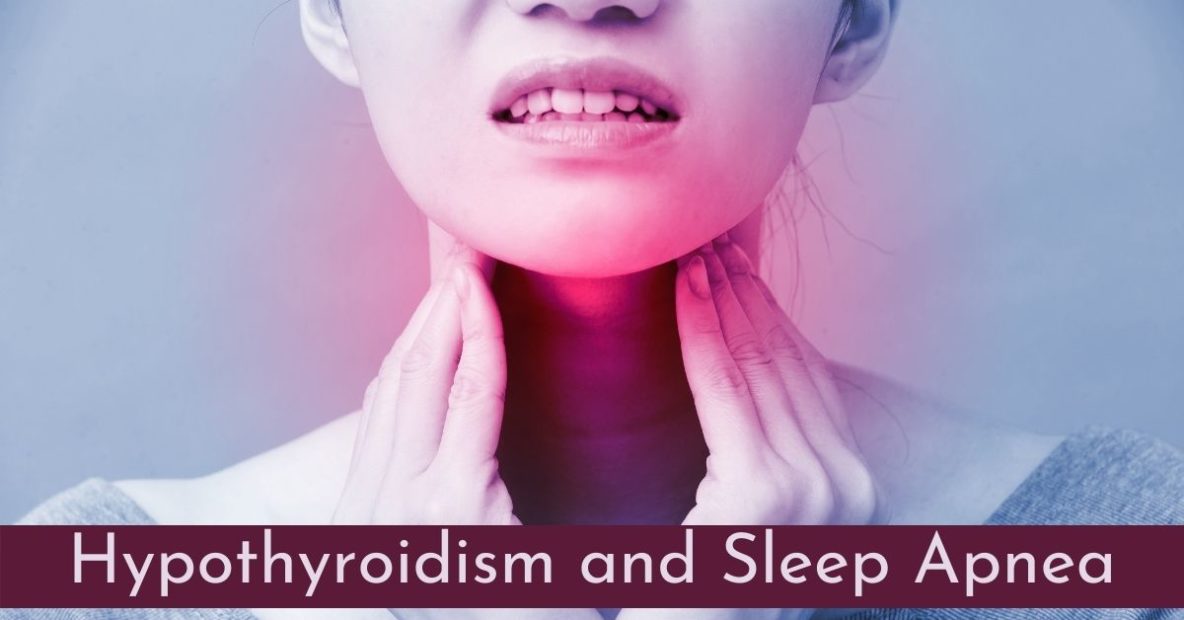Hypothyroidism and Sleep Apnea

- A Promising Paradigm Shift: New Research Challenges the CPAP-First Approach to OSA Treatment - September 5, 2023
- Understanding Sleep Meditation Techniques - July 30, 2021
- How Online Learning Has Affected Sleep for Students - July 13, 2021
Do you have a thyroid disease? When the thyroid isn’t working properly you may experience disturbances in sleep, or even sleep apnea.
What is the Thyroid Gland?
The thyroid gland is a small gland at the front of your neck, underneath the Adam’s apple. Normally you can’t see or feel it. However, if the thyroid gland is swollen, you’ll feel a swelling on the sides and front of your neck.
The thyroid is an extremely important gland. It produces the hormones that control your metabolism, digestion, heart rate, breathing, and even controls how your body uses energy. These hormones also regulate your sleep-wake cycle and your natural circadian rhythm.
- Hyperthyroidism: When the thyroid is overly active and produces too much of these hormones, you can experience a fast metabolism, faster heart rate, and feelings of stress and anxiety.
- Hypothyroidism: When the thyroid is under-active, your body won’t have enough of these hormones. You’ll have less energy, feel tired, and be more likely to feel sad or depressed.
Your Thyroid and Sleep Issues
Thyroid imbalances can lead to sleep issues. People with hyperthyroidism will have a hard time falling asleep. They may feel stressed, or anxious, or suffer from night sweats.
Hypothyroidism also disrupts sleep. An underactive thyroid can make you feel cold at night, and lead to muscle or joint pain. It may take you longer to fall asleep and you may have a poor quality of sleep. Hypothyroidism is also linked to daytime fatigue, and the urge to fall asleep during the day.
Hypothyroidism and Sleep Apnea
Hypothyroidism also affects your breathing. People with hypothyroidism often experience shallow breathing, particularly at night. This slow and shallow breathing can increase your risk of developing sleep apnea. When the muscles in the throat relax during the night, your airways can become blocked. This is more likely to happen when there’s not enough airflow in your lungs.
When the airways are blocked, the brain will sense the lack of oxygen, and send signals to your body to wake you up from sleep. Sleep apnea disrupts your sleep with frequent moments of wakefulness. You may wake up 30 times in an hour to tighten the muscles in your throat and restart the flow of oxygen. You’ll wake up feeling tired, and struggle to have energy during the day.
Sleep Habits Can Cause Hypothyroidism
It’s also possible that your sleep habits can affect your thyroid gland. When you’re consistently sleeping fewer than seven hours, you have a greater risk of developing hyperthyroidism. Sleeping too much every night, on the other hand, can increase your risk of hypothyroidism. This is because your sleep cycles and the function of the thyroid are connected. The thyroid affects your sleep, and your sleep can also affect the thyroid.
Should You See Your Doctor?
The symptoms of hypothyroidism can be hard to spot at first. The symptoms often develop slowly, so you won’t notice the changes in thyroid function right away. The symptoms can easily be attributed to other medical conditions, so you may not realize your symptoms are due to an over- or underactive thyroid gland. Your doctor can run a number of tests to discover how your thyroid is functioning, and can rule out any other medical conditions.
You should also visit your doctor if you notice any swelling of the thyroid gland. Swelling in the neck or side of the throat can be a symptom of a thyroid disease or thyroid cancer.
Sleeping Better with Hypothyroidism
If you have hypothyroidism, there are ways you can sleep better. First, make sure your room is comfortable for sleeping. This includes turning down the temperature to 60-67 degrees for the night, using darkening blinds, and turning on a white noise machine if there are a lot of distracting sounds in your home.
Next, make sure your mattress is supporting you during sleep. Most mattresses need to be replaced after around seven years. Check your pillow and find out if it’s the right pillow for your sleeping posture.
Finally, develop good sleep habits. This includes going to bed and getting up at a consistent time every day, turning off your electronic devices about one hour before bed, and doing something relaxing before you climb under the covers.
For more tips on how to sleep better with hypothyroidism and to learn more about sleep apnea, contact us at Sound Sleep Medical today.
